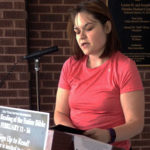- Lesson 6 in the BaptistWay Press Connect360 unit “Faith Under Fire” focuses on Daniel 5:1-31.
When a coach’s contract is up for renewal and the season’s record stands at two wins and 10 losses, the fans whisper: “The handwriting is on the wall.” Most likely, the imagery for the idiom comes from Daniel 5, where a hand—most likely the hand of God—writes on the wall. The book of Daniel does not deal with each and every Babylonian king. Our previous saga (chapter 4) dealt with King Nebuchadnezzar. Many kings, however, have come and gone between Nebuchadnezzar and his maternal grandson, Belshazzar.
Unfortunately, Belshazzar crossed a line at his lavish party when he called for the gold and silver goblets Nebuchadnezzar had removed from Jerusalem. Biblical scholar James A. Montgomery argued that the temple vessels were the only tangible remains of Israel’s religion. The prophet Isaiah already had made clear that the purity of these vessels was paramount. In Isaiah 52:11 we read, “Depart, depart, go out from here, touch nothing unclean; go out of the midst of her, purify yourselves, you who carry the vessels of the Lord.” Profaning the holy vessels from the Jerusalem temple, therefore, was an outrageous act, even for a man with pagan principles. The vessels represented both the power and presence of God. As one biblical scholar explains, “Belshazzar’s heart was a factory of rebellion against God.”
Then the hand began to write. While we are not told explicitly the source of the “fingers” and “hand,” we can be quite sure that they are a symbol for the presence of God. In Exodus 31:18, God’s fingers wrote the Ten Commandments (see Deuteronomy 9:10). And don’t forget the response of the Egyptian magicians after the acts of the plagues, as they remarked, “This is the finger of God” (Exodus 8:19). Finally, the psalmist declared the heavens themselves are the work of God’s fingers (Psalm 8:3).
The once-confident king now was terribly frightened: his face grew white; his mind went mad; his knees started knocking; and his bodily functions were beyond his control (his hip joints went slack). He soon would be dead.
We must learn from the mistakes of others. Seeing Nebuchadnezzar’s prideful downfall, Belshazzar should have avoided repeating the arrogant sins of his grandfather. Instead, he exalted himself against the God who humbled and restored Nebuchadnezzar. As a result, “the handwriting was on the wall.” He would be humbled; however, unlike his grandfather, he would not be restored. Numbered, weighed, divided.
Based on commentary written by Howard Batson, pastor of First Baptist Church in Amarillo, as condensed by Stan Granberry, marketing coordinator for BaptistWay Press.
To learn more about BaptistWay Press and the Connect360 Bible study series, or to order materials, click here.














We seek to connect God’s story and God’s people around the world. To learn more about God’s story, click here.
Send comments and feedback to Eric Black, our editor. For comments to be published, please specify “letter to the editor.” Maximum length for publication is 300 words.